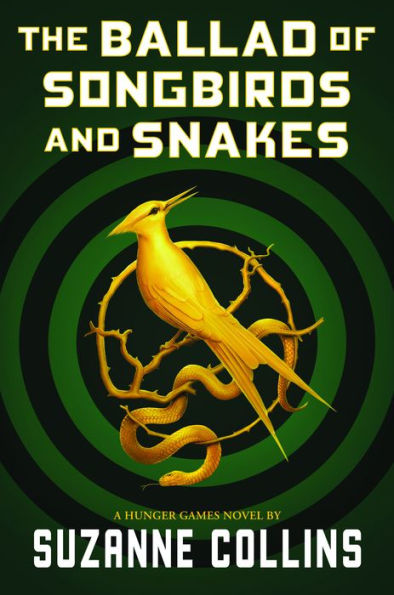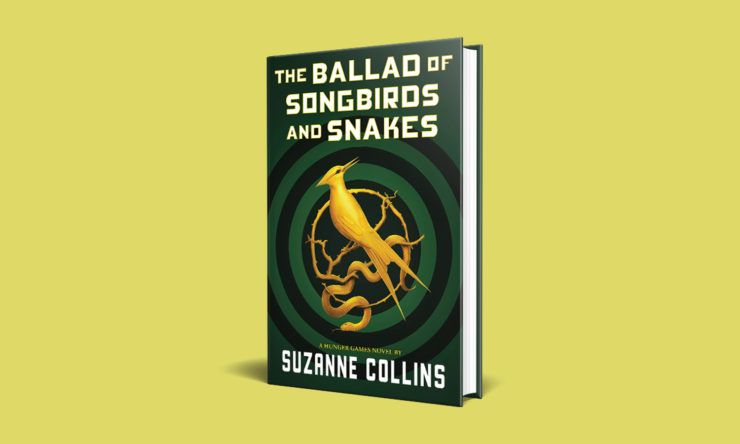The Hunger Games trilogy sold over 100 million copies worldwide. Its lead antagonist, the fascist sociopathic President Snow was a formidable opponent for the beloved hero Katniss, and a great personification of everything the Capitol represented. But sixty-odd years before Katniss enters the Games, Snow was an ambitious eighteen year old with a lot to hide, a lot to prove and a whole lot more to win. Suzanne Collins’ latest book is awkwardly titled The Ballad of Songbirds and Snakes, and while it was well known that this would be a prequel to The Hunger Games trilogy and that it would be about Snow, it was unclear as to whether it was really something that was needed to flesh out the world of the earlier three novels.
The title isn’t the only thing awkward about Ballad. Coriolanus himself, the plot, the pacing, the lack of narrative drive and even some of the writing itself is awkward, stilted and just baffling at times. This is besides the fact that we are faced with an unlikable protagonist—an antihero, if you will. This will throw off a great many fans, but appeal to just as many others (and there are a lot of fans waiting for this book) interested to see how the great villain became who they know him to be. Sadly, the book doesn’t quite deliver even with its 500+ pages, leaving us with a strange final act that seems almost tacked on to either leave much to the reader’s imagination or leave room for a potential sequel.
May the odds be ever in our favour.
So much about young Coriolanus in Ballad is a lie, and we are complicit to it. The previously grand Snow family have lost everything after the war, other than their penthouse apartment which is now empty of everything but Grandmother Snow’s roses, after years of them selling things off to survive. They live off Coriolanus’ cousin Tigris’ tiny income as an apprentice to a fashion designer, eating boiled cabbage endlessly as they try to maintain their social status by remaining in a property they soon will not be able to afford the taxes on. Coriolanus will do anything to keep up appearances of being part of a wealthy Capitol family, including actively avoiding thinking about what lengths Tigris may have had to go to in order to ensure he is well dressed at his final attempt at scoring a scholarship for University.
Coriolanus’ facade is so perfect that even we are almost sucked in to believing he really is this charming, smooth talking, well-meaning Capitol teen with a bright future. What he really is though, is smarmy and fraudulent and incredibly selfish. All of this is evident very early in the book, as Coriolanus charms his peers into believing he is a friend, that he is just like them in every way. Collins ensures that we are only aligned with Snow by choosing to write in close third person, so that we never witness or experience anything that he does not. This is an uncomfortable place to be, because he is clearly a complicated, Machiavellian person, and there are times when we find ourselves wondering if his perspective is even true to reality. How much of who President Snow is was Coriolanus’ nature, and how much it is the Capitol’s nurturing? It seems to be a clear matter of even distribution here, as we see him rarely struggle when it comes to choosing his own self over anyone else. Altruism, it seems, was never inherent in Snow.
Buy the Book


The Ballad of Songbirds and Snakes
This book isn’t just about Coriolanus’ evolution into the man who becomes President Snow. It’s also about the evolution of the Games themselves—we see the gamemakers and the first ever mentors discuss the virtues of the system, the potential it has to help the Capitol keep control over Panem, as the Capitol moves away from post-war restrictions towards the culture of excess we know it to have. It is this control that appeals to Coriolanus; as one of the Academy’s best and brightest students, he is attached to a tribute as her mentor in an attempt to make the games a ‘more meaningful experience’. The Capitol’s teenagers see nothing in common with the tributes, though they are of the same generation, all having been children when the war ended. ‘Surely you’re not comparing our children to theirs?’ asks one of them, ‘One look tells you ours are a superior breed.’ It is chilling to see how fast the privileged teenagers remove the humanity of the tributes, othering them, managing them in the arena as if they were nothing more than characters in a video game. It is Coriolanus who suggests introducing gambling to the Games, and in commercialising the survival odds of the tributes, he removes any remaining empathy anyone in the Capitol may have for them as fellow human beings, othering them to the point of no return.
Readers, too are distanced from the truth by being put into the position of voyeurs, desensitised to the suffering of the tributes by only ever watching them alongside the mentors and never suffering with them in the Games; the Capitol sets up concession stands outside the arena where citizens come to watch on large screens, waiting for children to kill each other as they casually eat their way through more food than most in the districts have seen in days, luxuries they would never have experienced.
Collins never shows us the Games from the perspective of the tributes, as she does in the Hunger Games trilogy—we see them via camera, as Snow does, as the other mentors and organisers of the game do. We are forced to witness the violence of their deaths and their breakdown from a farther distance, and because we are only ever in the viewers gallery, we become implicit in the Capitol’s voyeurism.
The Games, in Ballad, are not the slickly produced virtually enhanced visual spectacle we saw them to be in the trilogy. The are a bit of a ramshackle affair, happening in an old broken-down, bombed out stadium, where most of the tributes spend a fair bit of time hiding from each other in the stands. One of these tributes is singer and entertainer Lucy Grey from District 12, assigned to Coriolanus; he begins to feel something more for her, in what could be the most uncomfortable romance YA has seen for a while. Lucy Grey stands out right away when she slips a snake to the daughter of her District’s Mayor, and sings a song on stage as soon as she is called out, causing Coriolanus to ask himself, ‘”How to wrangle some success from a dress, a snake, a song?” It turns out it’s not all that hard—but we already knew that from our time with Katniss.
Is it a District 12 girl who breaks Coriolanus’ heart and sets him on the path to becoming President Snow? No spoilers here, but no, it’s not. But it may well be a District 12 girl with a penchant for song, a certain unique dress sense and a love for Mockingjays that causes him to hate Katniss quite so much. It is unnerving that Coriolanus, while seemingly falling for Lucy Grey (whom he knows to be an unlikely victor), is also perfectly capable of suggesting ways to make the Games more of a spectacle, of finding ways to make her more of a precious commodity in the arena. Lucy Grey herself never quite becomes believable, just as her relationship with Coriolanus doesn’t.
In the final third of the book, Coriolanus is faced with flocks of Mockingjays, birds that have now ran amok in Panem woods, after the original Capitol-engineered Jabberjays that fathered them are removed. ‘This elimination of the Capitol birds from the equation deeply disturbed him. Here [the Mockingjays] were, multiplying like rabbits, completely unchecked. Unauthorised. Co-opting Capitol technology. He didn’t like it one bit.” Any disturbance to the power balance that Coriolanus considered necessary to continue his privileged existence in the Capitol bothers him immensely, just as anyone stepping out of line in the Districts does. “It frightened and infuriated him. This breaking of the contract. This invitation to chaos and all that could follow. Didn’t these people understand that the whole system would collapse without the Capitol’s control?” It is this control that Coriolanus is desperate to hold on to—it’s the only thing that differentiates him from the tributes, and the citizens of the Districts. It jars him to hear Dr Gaul, the lead Gamemaker, say that anyone in the arena would act with the same bestial violence, that survival mechanisms are the same for all humans: “What happened in the arena? That’s humanity undressed…How quickly civilisation disappears. All your fine manners, education, family background, everything you pride yourself on, stripped away in the blink of an eye, revealing everything you actually are.” Corioalnus never wants to reveal who he is—perhaps because he does not know yet, or because he is aware he isn’t ‘good.’
It is always a gamble to write a book that aligns the reader only with a deeply unlikeable protagonist, one with whom it is extremely difficult to empathise. Readers are meant to feel for Coriolanus’ cabbage soup poverty, but it is difficult when we see how mercenary he is, how ruthlessly ambitious and dissembling his personality is. His self-serving, egocentric narcissism is so constant that it offers no reprieve—not to the reader or to the character. The Ballad of Songbirds and Snakes is an ambitious attempt at including readers in the growth and evolution of both an enemy and a society, but falls short of that, since it is only the society that we see grow (and that too, for the worst, as expected). Collins is once again able to set frightening scenes that ask valid questions, but Coriolanus sadly remains just as flat as he started out, and far less interesting as a teen than he is as President. If anything, the insight we are given into his youth, his family, and his past help to make President Snow more interesting, not The Ballad of Songbirds and Snakes.
The Ballad of Songbirds and Snakes is available from Scholastic.
Mahvesh loves dystopian fiction and appropriately lives in Karachi, Pakistan. She writes about stories and interviews writers for the Tor.com podcast Midnight in Karachi when not wasting much too much time on Twitter.










